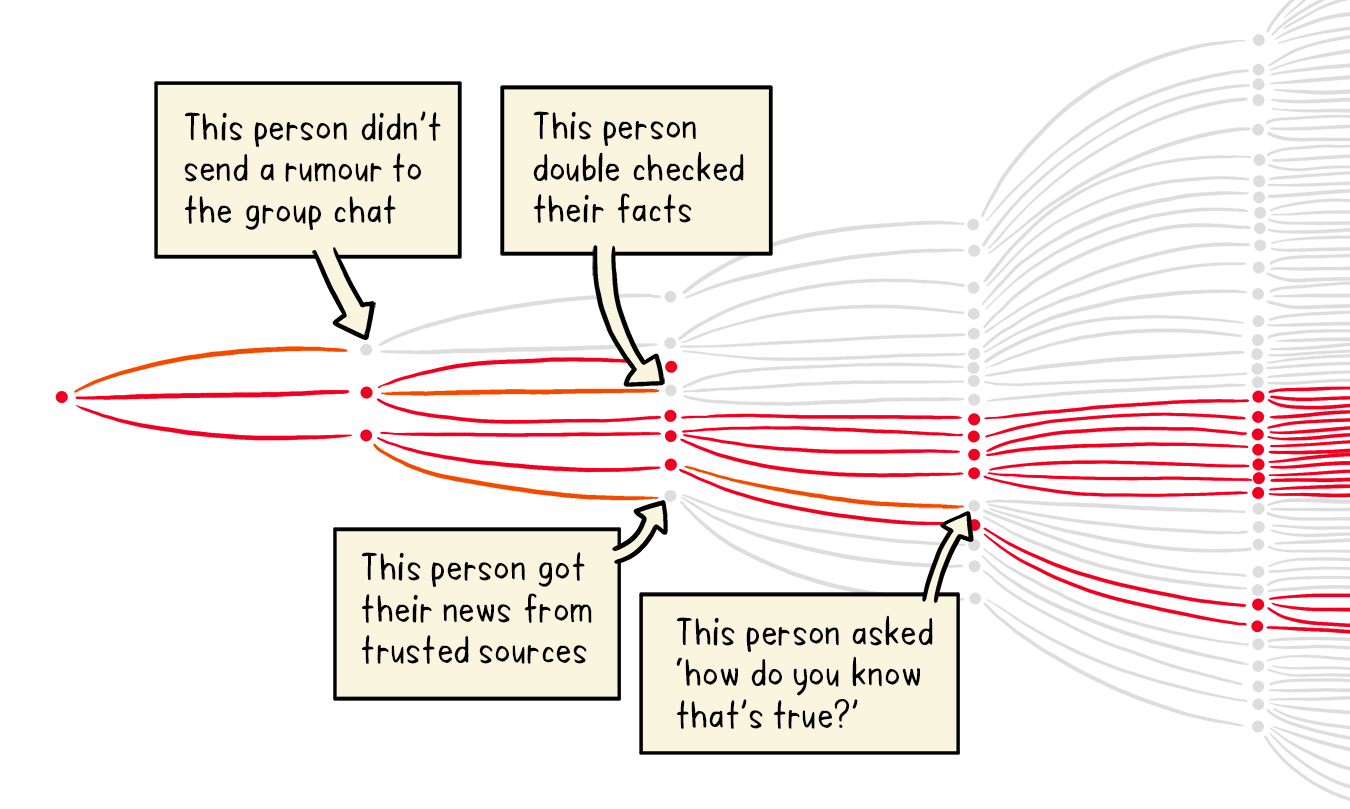No matter where you are in your nursing career, consider yourself on the front line of the COVID-19 battle. That’s because nursing is considered the most honest and ethical profession. For the 19th year in a row, Gallup poll results put nurses in the Number One spot; 89% of Americans feel that nurses rank highest of 15 occupations in their honesty and ethics. (As a comparison, physicians have a 77% rating and pharmacists have a 71% rating.)
With so much public trust comes a heavy responsibility to provide accurate information about COVID-19. Family, friends, neighbors—anyone you encounter—will rely on your knowledge and expertise regarding how to prevent transmission and stay healthy during the pandemic.
Vaccination is a priority, but there are some hurdles
As COVID-19 ( SARS-CoV-2) vaccines become available, you’ll be asked many questions about safety. A Pew Research poll in December 2020 reported over half of Americans are will definitely or probably be immunized; about 39% intend to refuse the opportunity to get vaccinated. Another 18% will wait to see what happens before deciding.
The World Health Organization (WHO) supports vaccination to achieve herd immunity, the indirect protection against a disease that results when a percentage of the population becomes immune. The threshold, or percentage of immune population, is different for every disease. For measles, 95% of the population must be vaccinated. Polio requires an 80% vaccination rate. No one knows yet what the COVID-19 threshold will be; currently, estimates are 60-70%. Dr. Anthony Fauci has suggested that herd immunity could require up to 85%. Of course, higher vaccination rates protect everyone.
Nurses can expect to find mistrust or hesitancy about vaccinations. Being aware of cultural issues can be helpful when presenting information. Common reasons are related to several complex factors:
- Minorities, especially people of color, have long had a distrust in medicine. Inequity of care and participation in harmful research cause hesitancy to receive a “new” vaccine.
- Americans who see themselves as healthy or unlikely to get the virus, and be hospitalized, tend to refuse the vaccine, because they don’t see a need.
- Reluctance to be among the first to be vaccinated is common. The Pew survey found over 60% of respondents wanted to wait 6-12 months for more data.
- People who get an annual flu shot are much more willing to get a COVID-19 vaccination. They have a long-time trust in vaccine development.
- Political conservatives have had more general mistrust about the harmful impact of the pandemic than liberals, extending to wearing masks and social distancing.
Be a Myth-Buster about the COVID-19 vaccines
Here are some false statements or beliefs you can expect to hear about the vaccines—and how to quickly respond to them:
FALSE: The vaccines were rushed, so I don’t trust them.
The technology, called Messenger RNA or mRNA, used to develop the vaccines has been used for 30 years. Yes, the COVID-19 vaccines are the first to benefit from the technology, but the science is well-founded.
FALSE: Getting vaccinated can give me COVID-19.
There is no live virus in mRNA vaccines. The vaccines cause cells to make only a portion of the “spike protein,” resulting in an antibody response to the actual spike protein. This is not the same as being infected and does no harm to the person.
FALSE: I already had COVID-19, so I don’t need to get vaccinated.
After recovering from COVID-19, up to 95% of people showed that immunity can last up to eight months. But this is a new disease, with varying outcomes, and scientists don’t know if immunity will persist. Some COVID-19 patients have been reinfected, so vaccination is still recommended.
FALSE: There are severe side effects.
All vaccinations can result in side effects, such as soreness at the injection site, fever, headache, and fatigue. These are normal signs of the body building immunity. About 10-15% of people who received a COVID-19 vaccine report “significantly noticeable” side effects, which resolve in a day or two.
FALSE: The vaccines will permanently change my DNA.
Here’s what the CDC says: “mRNA from the vaccine never enters the nucleus of the cell and does not affect or interact with a person’s DNA…it never affects genetic material.” After antibodies are produced, the immune system protects against future infection.
FALSE: I’m pregnant or breastfeeding, so I should avoid getting vaccinated.
The CDC, American College of Obstetricians and Gynecologists, and Society for Maternal-Fetal Medicine all agree that the mRNA COVID-19 vaccination should be offered to pregnant and breastfeeding women. Women should discuss this with their providers.
FALSE: If I get the vaccine, I won’t have to wear a mask or socially distance anymore.
It can take up to two weeks to develop full immunity after vaccination. Scientists are determining if a vaccinated person can still carry or transmit the virus. You should continue to follow all safety guidelines until herd immunity is achieved.
Find and share reliable vaccine resources
One of your responsibilities as a nurse is to always use dependable sources. Don’t share any information about COVID-19 or vaccinations from general websites. Stick with science-based organizations that provide accurate data that is updated on a regular basis. Content should well-researched and peer-reviewed.
Centers for Disease Control and Prevention (CDC) offers information and education materials for professionals and the public. It’s a good place to start when searching for current topics, specific diseases, and preventing transmission.
You can refer anyone to the CDC website with confidence. Some current links for COVID-19 to recommend to someone seeking basic information:
About COVID-19: Symptoms, Testing, How COVID-19 Spreads, and Guide to Masks
About vaccines:
Key Things to Know About COVID-19 Vaccines
Benefits of Getting a COVID-19 Vaccine
What to Expect at Your Appointment to Get Vaccinated for COVID-19
Healthcare professionals can find extensive resources to improve their practices:
COVID-19 Published Science and Research
If you work in a healthcare setting, you can download free materials, such as posters, stickers, and a comprehensive COVID-19 Vaccination Toolkit with videos and slides.
World Health Organization (WHO) has been committed to global health since 1948. Although it covers every type of human health condition—prevention, wellness, and disease—the current focus has been on COVID-19 around the world. The website has a dashboard with a map of worldwide cases that is constantly updated.
WHO has a “Vaccination Series” that provides information for most countries and in many languages. The series has solid information on all current vaccines and is written at an elementary level. There is an excellent downloadable document about misinformation, “Let’s flatten the infodemic curve.”

Facts about COVID-19 treatments and cures are also covered, addressing customs and beliefs from around the world. As a nurse working with other cultures, you may encounter myths that need to be corrected. Some facts to keep in mind include:
- Vitamin and mineral supplements cannot cure COVID-19.
- Hydroxychloroquine does not have clinical benefits.
- Dexamethasone is not a universal treatment for COVID-19.
- Water or swimming does not transmit the virus.
- The likelihood of shoes spreading COVID-19 is very low.
- Houseflies do not carry the COVID-19 virus.
- Sun exposure and high temperatures are not protective.
- Drinking alcohol does not prevent COVID-19.
In the United States, several institutions and medical centers offer excellent information geared toward the public. They rely on proven academic and scientific research, then present it in an easy-to-understand format. Many consumers are more comfortable getting information from a well-known hospital or organization. (Get the annual US News & World Report “Best Hospital” list here.)
When someone asks you about COVID-19 and vaccinations, you can trust these websites:
Cleveland Clinic:
COVID-19: What You Need to Know About the Vaccine
Johns Hopkins:
Mayo Clinic:
Coronavirus disease 2019 (COVID-19)
COVID-19 vaccines: Get the facts
UCLA Health:
What Everyone Needs to Know About COVID-19
Get your own training and education on COVID-19 vaccinations
CDC offers education and training programs, based on current immunization guidelines. With the ongoing need to provide vaccines to as many people as possible, every nurse should learn about the vaccine and how to administer it.
Nurses can obtain free CNE credits for taking a training course, as well as a certificate of completion for each course. Visit the Training and Continuing Education Center (TCEO) to register before starting a course. Courses and webinars include:
You Call the Shots: An interactive, web-based immunization training course. The course is not restricted to COVID-19. Most vaccines, as well as general information about vaccination, are included. A series of modules provides current details, self-test practice questions, reference materials, and a glossary.
Immunization Courses: Web-based and on-demand, these modules take between 15 minutes to 3 hours to complete. The courses cover different vaccinations, but for COVID-19, you can take:
COVID-19 Vaccine Training: General Overview of Immunization Best Practices for Healthcare Providers: A quick overview about COVID-19 vaccine Emergency Use Authorization and safety. It also covers vaccine storage, handling, administration, and reporting.
Moderna COVID-19 Vaccine: What Healthcare Professionals Need to Know: A module specific to the Moderna vaccine, learn about vaccine storage, preparation, and administration. There is also a short section on disease detection and prevention, such as smoking cessation, weight reduction, diabetes screening, blood pressure screening, and other immunization services.
Pfizer-BioNTech COVID-19 Vaccine: What Healthcare Professionals Need to Know: A module specific to the Pfizer-BioNTech vaccine, learn about vaccine storage, preparation, and administration. There is also a short section on disease detection and prevention, such as smoking cessation, weight reduction, diabetes screening, blood pressure screening, and other immunization services.
General Best Practice Guidelines for Immunization: This 3-hour course is divided into 10 sections: 1) Timing and Spacing of Immunobiologics; 2) Contraindications and Precautions; 3) Preventing and Managing Adverse Reactions; 4) Vaccine Administration; 5) Storage and Handling of Immunobiologics; 6) Altered Immunocompetence; 7) Special Situations; 8) Vaccination Records; 9) Vaccination Programs; and 10) Vaccine Information Sources.
How Nurses and Medical Assistants Can Foster a Culture of Immunization in the Practice:
A course that targets parents, you may find this short course useful in both your professional and everyday lives. It’s meant to educate parents on the importance and value of vaccinations for their children.
Nurses are advocates for patients and the face of healthcare
More than ever, nurses are being asked to step up during the COVID-19 pandemic. Whether you are employed in a hospital, work in an alternate setting, or serve as a neighborhood resource, people will consider you an expert on the virus.
- Download and print the American Nurses Association’s Guiding Principles for Nurses and the COVID-19 Vaccines as a reference and reminder of why you became a nurse.
- Learn all you can about the COVID-19 disease process and the vaccines. More vaccines will be approved, so do your best to keep up. Others will be relying on you for accurate information.
- Myths will continue to crop up. As the most trusted healthcare professional, you can have great impact on those who lack proper facts or mistrust the medical system.
- Help others find access to vaccines. Many people don’t know how to register or how to find locations. Even if there is a waiting list, at least others are in the pipeline.
- Of course, get vaccinated yourself, and be sure your loved ones are immunized, too. Lead by action; confidence in the vaccines leads to a healthier community.
 By
By 



